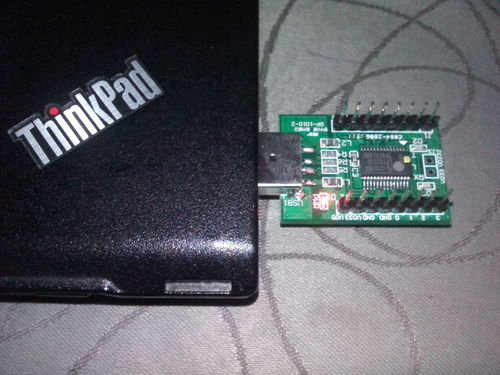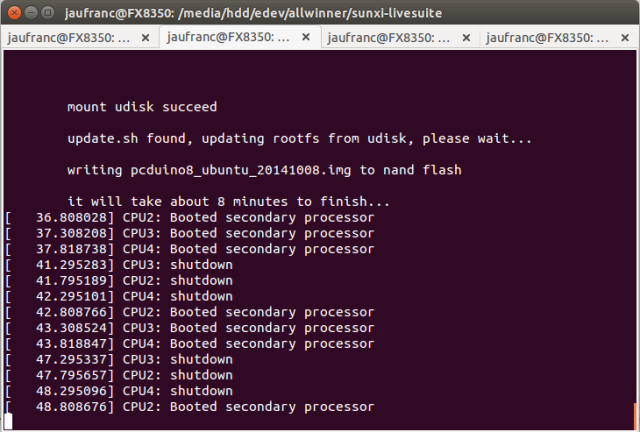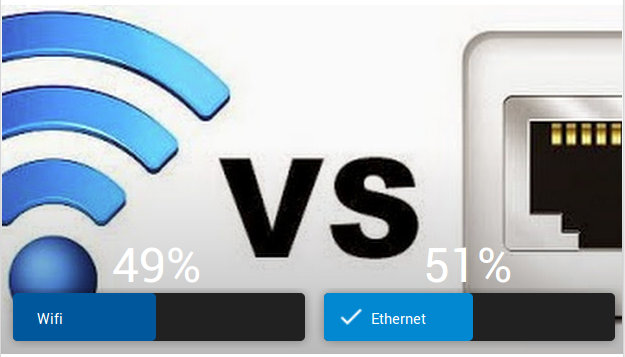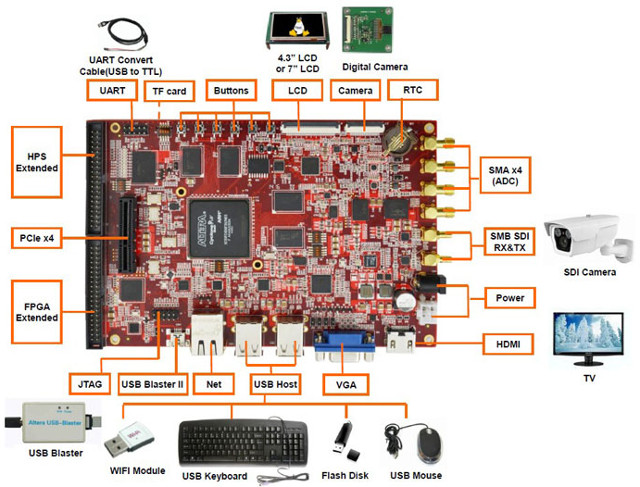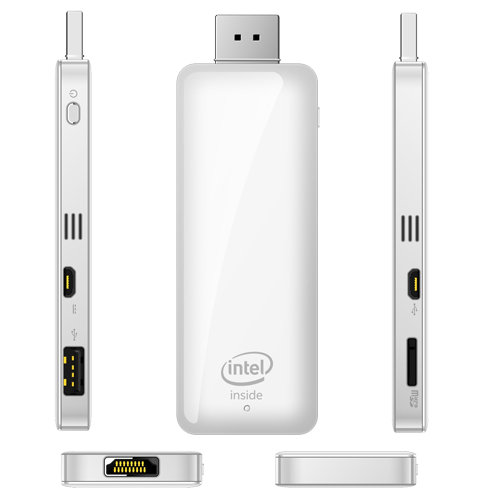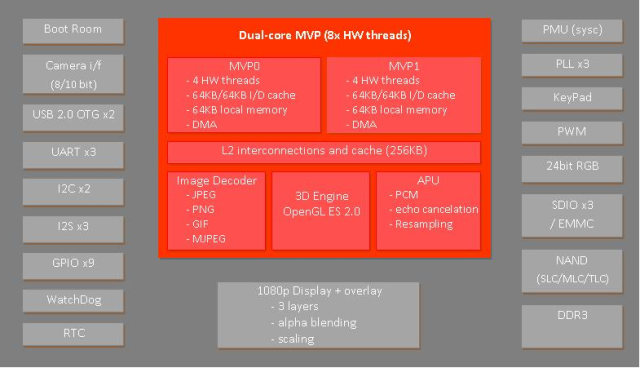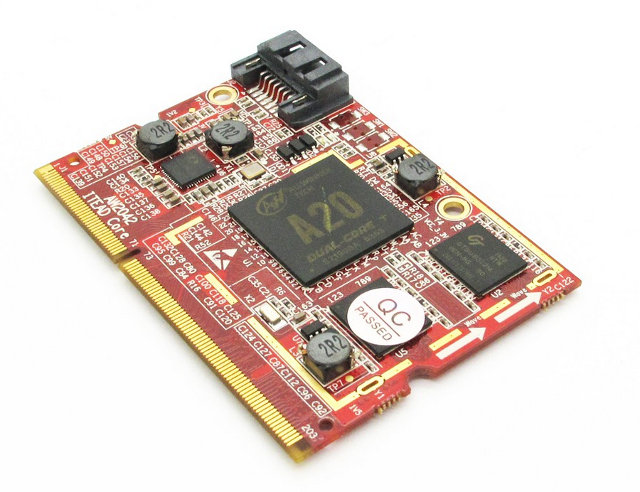It’s possible to to add GPIOs to your computer, (openWRT) router, or Android tablet using some FTDI USB dongles that expose I/Os. On operating systems based on Linux, including Android, you can use the GPIO sysfs interface (/sys/class/gpio) to easily control GPIOs from the command line, and in some cases Rx, Tx, CTS, .. pins can also be used as GPIOs. Zoobab has tried it with various FTDI USB adapters, and Oneping OP-1010 breakout board based on PL2303 HDX chip, and the results are mixed, but it could worth a try. There are currently patchsets ([1] and [2]) awaiting acceptance to mainline kernel that will enable GPIO support for these USB devices, but in the meantime you need to patch the kernel yourself, and then enable the relevant options in the kernel config for example “USB_SERIAL_PL2303_GPIO” or “USB_SERIAL_FTDI_SIO_GPIO”. The first patch is for PL2303 chips, and the second for FT2xxx/FT4xxx […]
Updated Android 4.4 Beta and Ubuntu Images for pcDuino8 / A80 OptimusBoard Boards Released
pcDuino8 and A80 OptimusBoard are the only two Allwinner A80 development boards currently “somewhat” available, and albeit the PCB color is different, every else is basically identical, and pcDuino8 firmware should probably run on A80 OptimusBoard and vice versa. If you own any of these boards, you may interested in two images, one with Android 4.4 (beta), and one with Lubuntu, recently released by pcDuino / Linksprite. Android 4.4 (beta) 2014-10-08 – sun9iw1p1_android_optimus.img to be flashed with PhoenixCard (Windows) or Livesuit (Linux) Lubuntu 14.04? 2014-10-08 is comprised of two files: Kernel – pcduino8_kernel_livesuit_20141008.img to be flashed with PhoenixCard or Livesuit first. See instructions to use Livesuit with A80 OptimusBoard. Rootfs – pcduino8_ubuntu_20141008.rar. First extract the rar files to the root of an SD card or USB flash drive. There should be two files: pcduino8_ubuntu_20141008.img and update.sh. Now connect the mass storage device to pcDuino3 / A80 Optimusboard, and reboot the […]
Mini PC Polls: Networking Connectivity, Video and Audio Outputs
It’s always interesting to find out how people use their devices, and I recently discovered Google+ support Polls as Droidmote posted a poll to find out whether people used Wi-Fi or Ethernet with their mini PCs, and I followed up with polls about video and audio outputs. Around 50 people have answered to each poll up to now, so even if it may not representative, let’s have a look at the results so far. About half of the people are connected via Ethernet, and the other half are using Wi-Fi after 43 votes. Wi-Fi is normally more convenient, but may not be as reliable, and for users playing high bitrate videos Ethernet is a must, unless you find buffering enjoyable…. After 58 votes, most people still connect their mini PC to a Full HD television via HDMI, with a few connecting it to a 4K UHD TV, and nobody using […]
Lark Board Powered by Altera Cyclone V SX ARM Cortex A9 + FPGA SoC
Farnell/Element14 has quietly announced Lark Board from their subsidiary Embest Technology in September. The board is powered by an Altera Cyclone V ARM Cortex-A9 dual-core + FPGA processor with high speed transceivers, runs Debian 7.4, and targets medical instruments, video surveillance and industrial control applications. Lark board specifications: SoC – Altera Cyclone V SX (5CSXFC6D6F31I7N) with a dual core Cortex A9 processor (HPS – Hard Processor System) @ 800 MHz, FPGA fabric including up to 110K logic cells (LE), and high speed transceivers (2 PCIe hard IPs and 9 3Gbps transceivers) System Memory – 1GB DDR3 SDRAM for HPS, 1GB DDR3 SDRAM for FPGA Storage – 4GB eMMC Flash + micro SD card slot Audio/Video Interfaces – HDMI, VGA, and 24-bit LCD interface supporting 4-wire touch screen Data Transfer Interfaces: High-resolution serial digital interface (SDI) that supports SMD standard interface and provides a SDI TX and a SDI RX 12-bit […]
MEEGO-T01 HDMI TV Stick Supports Android, Windows 8.1, and Ubuntu/Linux
ARM based HDMI TV dongles have been available for over two years, mostly running Android, but the community has managed to install Linux desktop operating systems such as Ubuntu or Debian on these tiny gadgets with some limitations. But now that Intel is making low power SoC for tablets, at least one company has decided to make an HDMI TV stick powered by Intel “Bay Trail-T” Z3735F/G quad core processor, which can run Android, Windows 8.1, and Linux based desktop operating systems such as Ubuntu. Meegopad MEEGO-T01 (aka APM-D01?) hardware specifications: SoC – Intel Atom Z3735F / Z3735G “Bay Trail” quad core processor @ 1.33 GHz (Bust freq: 1.83 GHz) with Intel HD graphics (2W TDP) System Memory 1 GB DDR3L-1333 for Z3735G (32-bit up to 5.3 GB/s) 2 GB DDR3L-1333 for Z3735F (64-bit up to 10.6 GB/s) Storage – 16 or 32 GB eMMC + micro SD slot Video […]
ICube MVP SoCs Combine CPU and GPU into a Single Unified Processing Unit (UPU)
ICube is a fabless semiconductor company developing SoCs featuring a Unified Processing Unit (UPU) that takes care of the tasks usually handle by separate CPU and GPU on typical SoCs. The UPUs are based on MVP (Multi-thread Virtual Pipeline) instruction set architecture, and are themselves called MVP cores. The company has now two SoCs based on UPU MVP cores: IC3128 and IC3228. IC3128 is a single core / 4 thread SoC, and IC3228 is a dual MVP core / 8 threads SoC. Let’s have a look at IC3228 technical specifications: CPU function 4-way simultaneous multi-threading (SMT) in each core Symmetric-multi-processing (SMP), dual MVP cores 64KB I-cache, 64KB D-cache and 64KB local memory in each core, 256KB shared L2 cache Homogeneous parallel programs Support Pthread, OpenMP GPU function Data parallel, Task parallel, and/or Function parallel computing Multi-standard media processor Programmable unified shader Support OpenGL ES 2.0 70 million triangles / sec, […]
ITEAD Core AW204X AllWinner A20 SoM and Core EVB Baseboard
ITEAD Studio has been making systems-on-module based on Allwinner processors for a little while which are found in the company’s IBOX mini PC, MOD Duo guitar pedal, and more. They’ve now launched a new system-on-module with a 204-pin SO-DIMM connector instead of the headers used in the earlier modules. ITEAD Core AW2041 / AW2042 SoM specifications: SoC- AllWinner A20 dual core ARM Cortex-A7 @ 1 GHz + ARM Mali 400 MP2 System Memory – 1 or 2 GB DDR3 RAM (AW2014: 1GB, AW2042: 2GB). Storage – 4GB NAND Flash, micro SD card slot (on the back), SATA connector. Connector – 204-pin SO-DIMM edge connector with UART, I2C, SPI, LCD, I2S, LVDS, GPIO, etc.. signals Misc – Built-in RTC, reset, FEL and power buttons. Power – 5V supply, 3.3V I/Os. AXP209 PMIC. Dimensions – 67.60 x 48.25 x 1.6 mm Weight – 35 grams Temperature Range – Commercial To facilitate development, the […]
Linux 3.17 Released
Linus Torvalds announced the release of Linux Kernel 3.17 on Sunday: So the past week was fairly calm, and so I have no qualms about releasing 3.17 on the normal schedule (as opposed to the optimistic “maybe I can release it one week early” schedule that was not to be). However, I now have travel coming up – something I hoped to avoid when I was hoping for releasing early. Which means that while 3.17 is out, I’m not going to be merging stuff very actively next week, and the week after that is LinuxCon EU… What that means is that depending on how you want to see it, the 3.18 merge window will either be three weeks, or alternatively just have a rather slow start. I don’t mind getting pull requests starting now (in fact, I have a couple already pending in my inbox), but I likely won’t start processing […]


